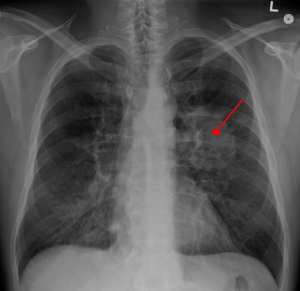Lung cancer is the uncontrolled growth of abnormal cells in one or both lungs. These abnormal cells do not carry out the functions of normal lung cells and do not develop into healthy lung tissue. As they grow, the abnormal cells can form tumors and interfere with the functioning of the lung, which provides oxygen to the body via the blood.
The two general types of lung cancer include:
- Small cell lung cancer. Small cell lung cancer occurs almost exclusively in heavy smokers and is less common than non-small cell lung cancer.
- Non-small cell lung cancer. Non-small cell lung cancer is an umbrella term for several types of lung cancers that behave in a similar way. Non-small cell lung cancers include squamous cell carcinoma, adenocarcinoma and large cell carcinoma.
Symptoms of lung cancer that are in the chest:
- Coughing, especially if it persists or becomes intense
- Pain in the chest, shoulder, or back unrelated to pain from coughing
- A change in color or volume of sputum
- Shortness of breath
- Changes in the voice or being hoarse
- Harsh sounds with each breath (stridor)
- Recurrent lung problems, such as bronchitis or pneumonia
- Coughing up phlegm or mucus, especially if it is tinged with blood
- Coughing up blood
If the original lung cancer has spread, a person may feel symptoms in other places in the body. Common places for lung cancer to spread include other parts of the lungs, lymph nodes, bones, brain, liver, and adrenal glands.
Symptoms of lung cancer that may occur elsewhere in the body:
- Loss of appetite or unexplained weight loss
- Muscle wasting (also known as cachexia)
- Fatigue
- Headaches, bone or joint pain
- Bone fractures not related to accidental injury
- Neurological symptoms, such as unsteady gait or memory loss
- Neck or facial swelling
- General weakness
- Bleeding
- Blood clots
Diagnosis of Lung Cancer
- Imaging tests. An X-ray image of your lungs may reveal an abnormal mass or nodule. A CT scan can reveal small lesions in your lungs that might not be detected on an X-ray.
- Sputum cytology. If you have a cough and are producing sputum, looking at the sputum under the microscope can sometimes reveal the presence of lung cancer cells.
- Tissue sample (biopsy). A sample of abnormal cells may be removed in a procedure called a biopsy.We
 can perform a biopsy in a number of ways, including bronchoscopy, in which your doctor examines abnormal areas of your lungs using a lighted tube that’s passed down your throat and into your lungs; mediastinoscopy, in which an incision is made at the base of your neck and surgical tools are inserted behind your breastbone to take tissue samples from lymph nodes; and needle biopsy, in which your doctor uses X-ray or CT images to guide a needle through your chest wall and into the lung tissue to collect suspicious cells.A biopsy sample may also be taken from lymph nodes or other areas where cancer has spread, such as your liver.
can perform a biopsy in a number of ways, including bronchoscopy, in which your doctor examines abnormal areas of your lungs using a lighted tube that’s passed down your throat and into your lungs; mediastinoscopy, in which an incision is made at the base of your neck and surgical tools are inserted behind your breastbone to take tissue samples from lymph nodes; and needle biopsy, in which your doctor uses X-ray or CT images to guide a needle through your chest wall and into the lung tissue to collect suspicious cells.A biopsy sample may also be taken from lymph nodes or other areas where cancer has spread, such as your liver. - Genetic testing, which may also be referred to as “molecular profiling or mutation profiling,” allows to look inside tumor cells for gene mutations or changes that may have caused them to be cancerous. This testing helps to develop a treatment plan for the patient.
Treatment
Lung cancer is treated in several ways, depending on the type of lung cancer and how far it has spread. People with non-small cell lung cancer can be treated with surgery, chemotherapy, radiation therapy, targeted therapy, or a combination of these treatments. People with small cell lung cancer are usually treated with radiation therapy and chemotherapy.
- Surgery. An operation where doctors cut out cancer tissue.
- Chemotherapy. Using special medicines to shrink or kill the cancer. The drugs can be pills you take or medicines given in your veins, or sometimes both.
- Radiation therapy. Using high-energy rays (similar to X-rays) to kill the cancer.
- Targeted therapy. Using drugs to block the growth and spread of cancer cells. The drugs can be pills you take or medicines given in your veins.
REFERENCES
- www.lungcancer.org/
- www.cdc.gov/
- www.mayoclinic.org/
